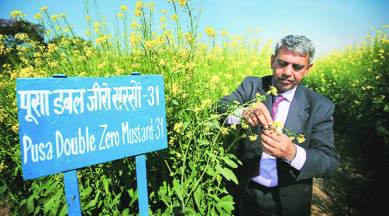Indian scientists have bred and released for commercial cultivation the first “canola-grade” mustard variety containing low levels of erucic acid and glucosinolates, regarded as negative from a health standpoint.
Pusa Double Zero Mustard-31 (PDZM-31), as it is called, is being grown in the current rabi season at the Indian Agricultural Research Institute (IARI) here for production of seed to enable planting on farmers’ fields from 2017-18.
“The seed yields are only about a quintal lower than the 24-25 quintals per hectare levels of normal high-yielding mustard varieties such as Pusa-Vijay and RH-0749. But the oil content in the seed is higher, at 41.5 per cent, than the 39-40 per cent for the latter. And the oil (used as cooking/frying medium) and defatted cake (used as animal/poultry feed) are of superior canola-quality,” claims DK Yadava, head of IARI’s Division of Seed Science & Technology and main breeder of the new variety.
Watch What Else Is making News
Oil from normal Indian mustard (Brassica juncea) has lower saturated fatty acids (around 7 per cent), compared to coconut (90), palm (50) or safflower, sunflower and soyabean (10-15) oil. That apparent health benefit is, however, offset by its 40-50 per cent erucic acid content, linked to myocardial fibrosis or impairment of the heart’s muscle cells. The protein-rich cake after extraction of oil, likewise, has glucosinolates, sulphur-containing compounds known to cause iodine deficiency at high concentrations. While glucosinolates aren’t a problem in mustard oil — whose trademark pungency comes from the free sulphur released when the seeds are crushed — their levels of up to 200 parts per million (ppm) in the cake reduces the feed value (protein efficiency) of meal fed to livestock and poultry.
The seeds from PDZM-31 will yield oil containing less than 2 per cent erucic acid and cake with below 30 ppm of glucosinolates — the same levels as in canola or rapeseed (Brassica napus) grown in Canada and Australia. In other words, canola-grade Indian mustard. Also, it is not genetically modified, unlike the nearly 400,000 tonnes of canola oil annually imported into India.
The seeds from the new variety are thin yellow-coated and the oil yellowish light-brown, while appearing to be refined even without refining. Normal Indian mustard seeds have thick brown coat and the oil colour, too, is brown. The leaves also do not have the bitterness and pungency associated with traditional sarson-ka-saag.
According to Yadava, PDZM-31 can be sown in October 1-20 just like regular mustard. Flowering starts in 45-50 days from December and terminates with seed setting by January-end, followed by seed filling during February and harvesting towards March 15-20. “The variety, released by the Delhi government, was notified in June 2016. The produce from this year’s crop we will supply both as truthfully labeled seeds for direct planting and as breeder material for further multiplication,” adds Yadava.
